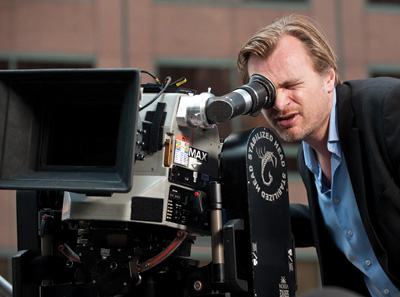


New interview with Chris Nolan
 Jeffrey Ressner interviewed Christopher Nolann recently for the Director's Guild Quarterly.
Jeffrey Ressner interviewed Christopher Nolann recently for the Director's Guild Quarterly.
While the interview is quite lenghty and covers the wide expanse of Nolan's career, it inevitably goes into Batman.
Below are a few excerpts.
On shooting with IMAX:
"We shot 5-perf 65 mm for a few scenes in Inception and I liked the results a lot, plus you can use sound with it. But IMAX has three times the negative area of that format. It’s such a leap up in terms of quality that if you’re working on a film that’s such a large-scale production you can embrace the more cumbersome technology, and allow for it and build it into your production process, then what you get in terms of quality when you’re shooting is pretty extraordinary. For The Dark Knight Rises we were on Wall Street with a thousand extras, and you can see everybody’s face in the frame. In some ways, I feel it takes me back almost to the silent film era, when they had those huge cameras. Trying to do things in more of a tableau fashion, it changes the way I direct a film, it changes the way I block the camera movement because of the size of the thing. The resulting image has so much power that you don’t need to cut in the same way, you can frame the shot slightly differently, you wind up with a slightly different feel."
Was there pressure to shoot The Dark Knight Rises in 3D?:
"Warner Bros. would have been very happy, but I said to the guys there that I wanted it to be stylistically consistent with the first two films and we were really going to push the IMAX thing to create a very high-quality image. I find stereoscopic imaging too small scale and intimate in its effect. 3-D is a misnomer. Films are 3-D. The whole point of photography is that it’s three-dimensional. The thing with stereoscopic imaging is it gives each audience member an individual perspective. It’s well suited to video games and other immersive technologies, but if you're looking for an audience experience, stereoscopic is hard to embrace. I prefer the big canvas, looking up at an enormous screen and at an image that feels larger than life. When you treat that stereoscopically, and we've tried a lot of tests, you shrink the size so the image becomes a much smaller window in front of you. So the effect of it, and the relationship of the image to the audience, has to be very carefully considered. And I feel that in the initial wave to embrace it, that wasn’t considered in the slightest."
You can read more here:
http://www.dga.org/Craft/DGAQ/All-Articles/1202-Spring-2012/DGA-Interview-Christopher-Nolan.aspx











by The Joker
by The Joker
by The Laughing Fish
by The Laughing Fish
by The Laughing Fish
by The Laughing Fish
by The Laughing Fish
by The Laughing Fish
by The Dark Knight
by The Joker